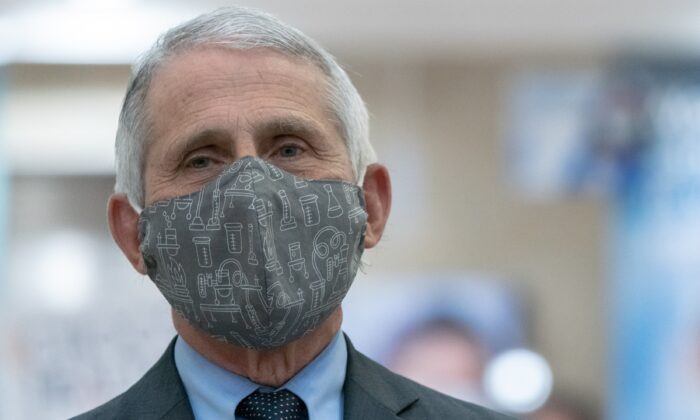
Dr. Anthony Fauci is seen in New York City in a file photograph. (Jeenah Moon/Getty Images)MORE
AMERICA
By Zachary Stieber
October 25, 2021 Updated: October 25, 2021
Top American health officials who critics say misled Congress with claims regarding U.S.-funded virus research in China are pushing back after documents were released appearing to show that the United States did pay for gain-of-function research, contrary to the officials’ testimony.
The National Institutes of Health (NIH) sent the documents last week to lawmakers. They show that the NIH funded research that increased the function of coronaviruses and MERS, experts said.
Dr. Francis Collins, the head of the NIH, and Dr. Anthony Fauci, who heads one of the institutes, told Congress earlier this year that the agency did not fund gain-of-function research.
Critics said the new documents were further proof Collins and Fauci misled Congress.
“In the letter they acknowledge that yes, the viruses did gain in function, they became more dangerous. So they’ve created a virus that doesn’t exist in nature to become more dangerous, that is gain-of-function,” Sen. Rand Paul (R-Ky.), a doctor, said on an “Axios on HBO” episode released Sunday.
“You take an unknown virus, you combine it with another virus and you get a super virus. You have no idea whether it gains functions or loses function, that’s what the experiment is, but I don’t know how anybody could argue that that’s not gain-of-function research,” he added later.
Fauci, though, is insisting that his testimony to Congress was not undercut by the agency’s disclosures.
AMERICA
By Zachary Stieber
October 25, 2021 Updated: October 25, 2021
Top American health officials who critics say misled Congress with claims regarding U.S.-funded virus research in China are pushing back after documents were released appearing to show that the United States did pay for gain-of-function research, contrary to the officials’ testimony.
The National Institutes of Health (NIH) sent the documents last week to lawmakers. They show that the NIH funded research that increased the function of coronaviruses and MERS, experts said.
Dr. Francis Collins, the head of the NIH, and Dr. Anthony Fauci, who heads one of the institutes, told Congress earlier this year that the agency did not fund gain-of-function research.
Critics said the new documents were further proof Collins and Fauci misled Congress.
“In the letter they acknowledge that yes, the viruses did gain in function, they became more dangerous. So they’ve created a virus that doesn’t exist in nature to become more dangerous, that is gain-of-function,” Sen. Rand Paul (R-Ky.), a doctor, said on an “Axios on HBO” episode released Sunday.
“You take an unknown virus, you combine it with another virus and you get a super virus. You have no idea whether it gains functions or loses function, that’s what the experiment is, but I don’t know how anybody could argue that that’s not gain-of-function research,” he added later.
Fauci, though, is insisting that his testimony to Congress was not undercut by the agency’s disclosures.
Vaccine Mandate Threatens Major Trucking Disruption, Industry Insiders Say
“Neither I nor Dr. Francis Collins, the director of the NIH, lied or misled about what we’ve done,” he said on ABC’s “This Week.”
A key issue in the arguments revolves around how the parties define gain-of-function, a type of research that generally means increasing a biological agent’s transmissibility or pathogenicity.
Fauci acknowledged using a narrower term established under a framework (pdf) issued in late 2017 after the agency lifted a funding pause on most gain-of-function research.
“Neither I nor Dr. Francis Collins, the director of the NIH, lied or misled about what we’ve done,” he said on ABC’s “This Week.”
A key issue in the arguments revolves around how the parties define gain-of-function, a type of research that generally means increasing a biological agent’s transmissibility or pathogenicity.
Fauci acknowledged using a narrower term established under a framework (pdf) issued in late 2017 after the agency lifted a funding pause on most gain-of-function research.
RELATED
Fauci, Washington's Highest-Paid Fed, Got Big Break Under George W. Bush
That term is called “gain-of-function research of concern” and entails “a small subset” of gain-of-function research projects that “entail risks that are potentially significant enough to warrant additional oversight,” according to the NIH.
“Under those conditions which we have explained very, very clearly, [the research in question] does not constitute research of gain-of-function of concern,” Fauci said. “There are people who interpret it that way, but when you look at the framework under which the guidance is, that is not the case.”
Fauci used the broader term before a Senate panel on May 11. “The NIH and NIAID categorically has not funded gain-of-function research to be conducted in the Wuhan Institute of Virology,” he said at the time.
Gain-of-function research “describes a type of research that modifies a biological agent so that it confers new or enhanced activity to that agent,” the NIH said on its website, before removing the description last week.
The Wuhan labs that comprise the institute are located near where the first cases of COVID-19 were detected in late 2019.
The newly disclosed documents from the EcoHealth Alliance, which funneled NIH grant money to the institute, outline research conducted between June 1, 2018 and May 31, 2019.
Collins, who is stepping down before the end of the year, has also pushed back against critics, telling The Washington Post that the research did not meet the definition of gain-of-function.
Some experts disagree.
“The genetic manipulation of both MERS and the SARS conducted in Wuhan clearly constituted gain-of-function experiments,” Jonathan Latham, executive director of the Bioscience Research Project, told The Epoch Times in an email.
Others have said the experiments were risky and should not have been conducted.
EcoHealth Alliance has not responded to requests for comment.
That term is called “gain-of-function research of concern” and entails “a small subset” of gain-of-function research projects that “entail risks that are potentially significant enough to warrant additional oversight,” according to the NIH.
“Under those conditions which we have explained very, very clearly, [the research in question] does not constitute research of gain-of-function of concern,” Fauci said. “There are people who interpret it that way, but when you look at the framework under which the guidance is, that is not the case.”
Fauci used the broader term before a Senate panel on May 11. “The NIH and NIAID categorically has not funded gain-of-function research to be conducted in the Wuhan Institute of Virology,” he said at the time.
Gain-of-function research “describes a type of research that modifies a biological agent so that it confers new or enhanced activity to that agent,” the NIH said on its website, before removing the description last week.
The Wuhan labs that comprise the institute are located near where the first cases of COVID-19 were detected in late 2019.
The newly disclosed documents from the EcoHealth Alliance, which funneled NIH grant money to the institute, outline research conducted between June 1, 2018 and May 31, 2019.
Collins, who is stepping down before the end of the year, has also pushed back against critics, telling The Washington Post that the research did not meet the definition of gain-of-function.
Some experts disagree.
“The genetic manipulation of both MERS and the SARS conducted in Wuhan clearly constituted gain-of-function experiments,” Jonathan Latham, executive director of the Bioscience Research Project, told The Epoch Times in an email.
Others have said the experiments were risky and should not have been conducted.
EcoHealth Alliance has not responded to requests for comment.


No comments:
Post a Comment